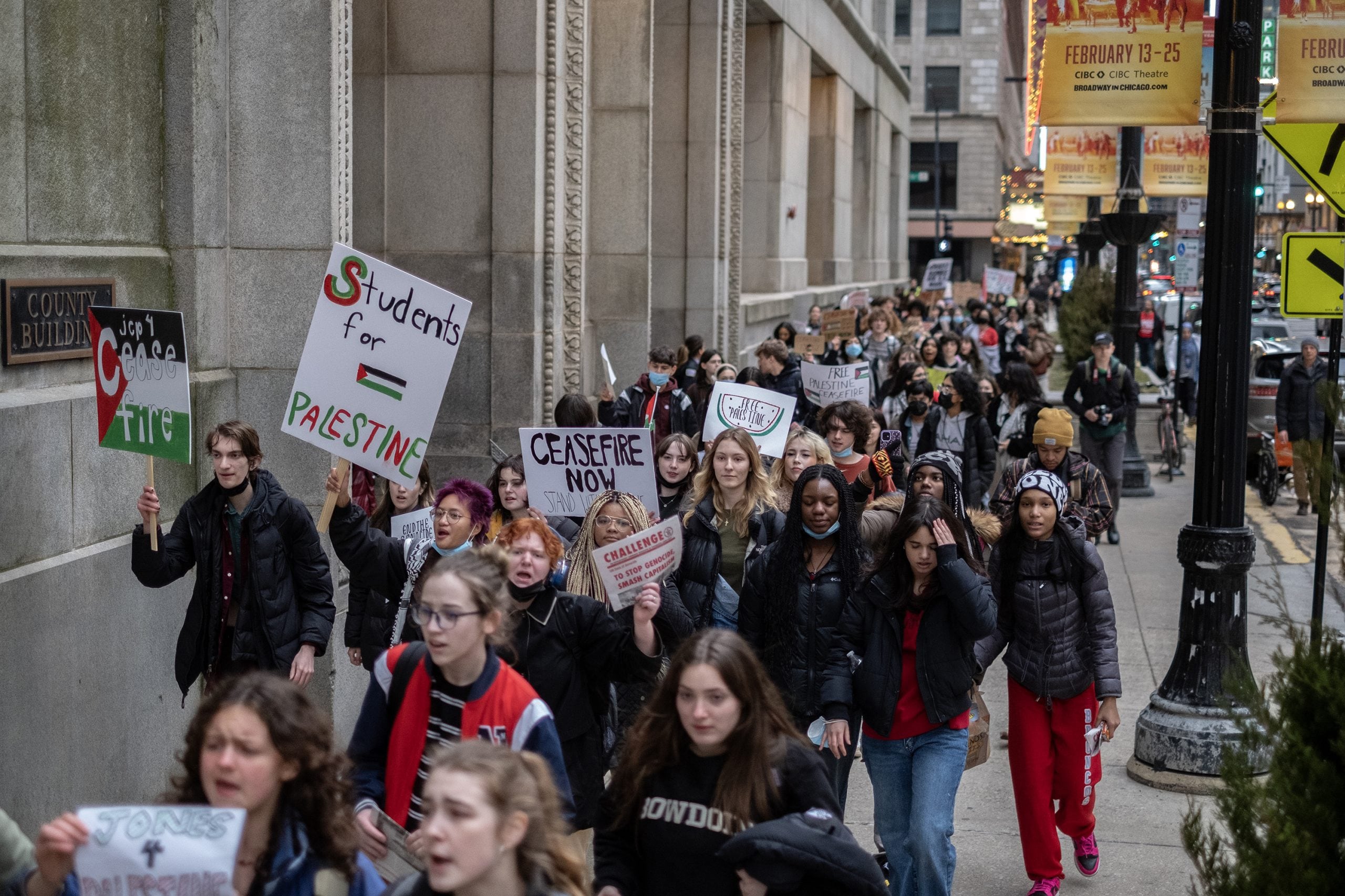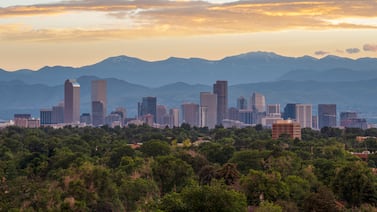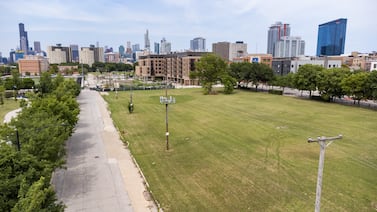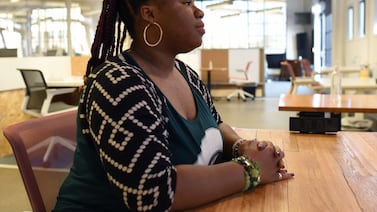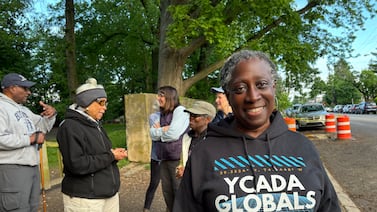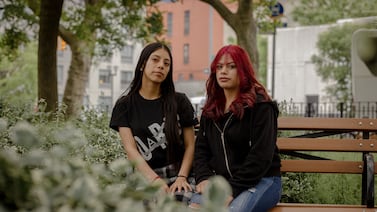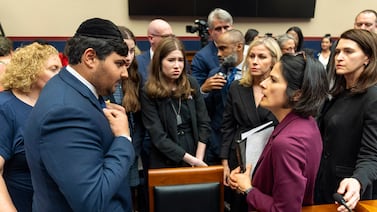Sign up for Chalkbeat Chicago’s free daily newsletter to keep up with the latest education news.
“When you think of the Israeli-Palestinian conflict, what feelings come up?”
A dozen Lincoln Park High School students, most of them Jewish or Arab American, pondered the questions and attempted to sum up months of intense emotion in just one word.
The students wrote their answers on a piece of paper, which they crumpled into a ball and tossed into a bowl. Then they took turns reading each other’s emotions. Nearly all had written the same words.
Angry. Frustrated.
“We broke down those emotions,” said Intisar Alkhatib, a student organizer at Lincoln Park, describing the scene on March 22. “It’s either coming from helplessness or we felt like there was more we could all do. We were glad we were in that circle.”
The exercise was part of PzTalks, a series of student-organized forums at high schools around the city. Chi Youth 4 Justice, the “abolitionist, anti-imperialist” student network that organized the walkouts supporting Chicago’s Gaza ceasefire resolution in January says the forums are a way of easing tensions that have arisen between Jewish and Arab American communities in Chicago schools due to the ongoing conflict in Gaza.
In an Oct. 7 attack on Israel, Hamas militants killed 1,200 people and took more than 240 hostages, with about 130 still captive, according to reports. In response, Israel has launched a military campaign in Gaza, killing thousands of Palestinians and spurring a humanitarian crisis, according to health authorities there.
Alkhatib, who is C4YJ’s co-president, said the group wants to balance activism in the streets with conversations that can bring understanding. “In protests, while they’re important, there’s only one prevailing voice,” Alkhatib said, “In conversations, there’s the fusion of many voices coming together.”
The first set of PzTalks was held between March 10 and March 23 at 10 Chicago public high schools, including South Shore High School, Lincoln Park, Von Steuben, and Hancock. Alkhatib said several more schools have PzTalks in the works.
Each school took a different approach to organizing the forums based on their school community’s demographics, environments, and priorities. Schools without significant Arab American, Jewish, or Palestinian populations focused on general solidarity and introduction to the issue.
Student organizers approached their respective school administrators about hosting the forums, and held conversations with and received advice from different organizations, including Jewish Voice for Peace, Latinxs for Palestine, and anti-war group Dissenters.
A’yanna, CY4J co-president and a student organizer at Kenwood Academy, said CY4J organizers reached out to Jewish and Arab American student groups at each school to get to know them and began the organizing process with personal conversations. Some students requested to be identified only by their first names for privacy reasons.
“We talked about not wanting to just be known for the walkout but to continue talking about these issues,” added Natalie, a student organizer at Von Steuben Metropolitan High School who did not want to provide her full name because of safety concerns. “We wanted to continue the conversation, not just have it be, we walked out and that was it.”
A space to really listen to one another
At Lincoln Park High School, Alkhatib worked alongside a teacher with experience in restorative justice circles to structure their PzTalk forum and focus on the connections and similarities between how Arab American, Palestinian, and Jewish students were feeling. Community facilitator Seph Mozes, an organizer and a member of Jewish Voice for Peace, also helped shape a conversation that could center those voices.
Alkhatib said some Jewish students were reluctant at first and did not want to be in a situation where they had to discuss politics, but after the initial conversation, some were appreciative and open to learning more.
With Arab American students, nobody was uncomfortable talking about it, Alkhatib said. “The idea of our lives are already politicized.”
The facilitators sought to approach this topic with understanding and recognizing the common intentions of everyone in the space, Alkhatib said.
Students began the forum by each sharing a value they wanted to bring into the space — empathy, open-mindedness, understanding — and by sitting in a circle to reinforce the sense of community and equity.
They used a talking object to ensure that everyone had their turn to speak and not interrupt one another.
“It forces you to reflect,” she said. “You have to be patient and listen to the full extent of what people have to say.”
Although the discussion included some background information and basic terminology, the focus at Lincoln Park, Mozes said, was less on having a teach-in and more about creating a conversation about how students from different perspectives could work together and bridge existing cultural gaps.
“Nobody came in intentionally trying to derail the conversation,” he said. “Everyone was focused and interested in having a productive conversation around justice at their school.”
With the forums being by and for students, some of that trust is already there, said Natalie, the Von Steuben student.
“Students feel that mutual solidarity because they know these students who are organizing,” Natalie said. “This is my friend from my club, my classmate. I have trust in that person.”
At Von Steuben, the small, intimate forum focused on giving Palestinian students an opportunity to share their experiences.
“Some students have family in Gaza and they’ve been struggling to continue their lives, having to go to school and continue to act like everything’s normal,” Natalie said. “We wanted to allow them an environment to talk about how they truly feel and how it’s been difficult for them.”
Alkhatib, who is Palestinian, said a mental toll comes with witnessing the scale of destruction in Gaza while going through the day-to-day of high school.
“Having to normalize that and still recalibrate my mind to do homework and focus on classes is driving me crazy,” Alkhatib said.
One of the students at Lincoln Park Alkhatib reached out to was Sophia Feinberg, who is Jewish. Feinberg, who attended the forum, says no close friends at school are Palestinian, Arab American, or Jewish, so Feinberg has become the go-to person for information about the conflict.
“I do my best to be like, ‘Here’s my point of view,’ but it’s not going to be the same for every person you ask,” Feinberg said.
One thing Feinberg appreciated about the PzTalk was that it provided an opportunity for students to speak one at a time and encouraged a space for them to really listen to one another, and that their experience at the forum made them want to get more involved.
“If it’s just talked about in one of your classes between friends, it’s more of an argument,” Feinberg said. “You aren’t there to hear. You’re there to defend your side. I’ve heard of instances of people at school saying something antisemitic or Islamophobic because they don’t know enough.”
Initially, Feinberg said students were a little nervous to speak, the opening circle reserved and awkward. But after Mozes asked how students were feeling, the energy shifted.
Alkhatib said when tension came up in the space, it was productive.
“It was emotionally charged because of the seriousness of what we talked about, but it felt comfortable,” she said. “Everyone was reassuring each other mentally, emotionally, through our body language.”
Mozes said he was familiar with being in the position of only hearing about Israel and Palestine from a Jewish perspective and wanting to understand Palestinian perspectives. He found that Arab American and Palestinian students in the forum were expressing the same sentiment — of only hearing about the topic from their cultural perspective and wanting to understand the Jewish perspective.
“It was coming both from Jewish students and Arab and Palestinian students wanting to get out of their own cultural perspective and hear from other students,” he said. “I think that speaks to the importance and power of youth being in public institutions that are diverse and have access to cultural perspectives that are not their own.”
‘A right to know and love each other’
More than 30 students attended the forum at John Hancock College Preparatory High School.
Student organizers partnered with Latinxs for Palestine, whose founders Ricardo Gamboa and Haneen Shriam spoke. Students discussed intersectionality and similar struggles between Latino and Palestinian communities.
Raven, a student organizer at Hancock who also did not want to share his full name due to safety concerns, said he hopes students who attended the event gained a better understanding of why community members are advocating for Palestinians, and that peers expressed that the space made them feel less alone.
So far, Alkhatib said, there hasn’t been large-scale pushback over the PzTalks. At Hancock, Raven there was some concern from community members that students were uninformed, but the support he and his peers have received far outweighs any disapproval.
“We put hours and days into the research we do for our talks and teach-ins,” he says.
While some school administrators have been supportive, others have not been, CY4J organizers said.
“Some have been wary because they are scared or because it’s not a priority to them, so that’s one of the struggles,” Alkhatib said. “When we’re trying to implement the PzTalks, we try to get admin approval and work with teachers and resources within the school to ensure it’s the safest and most productive.”
Chicago Public Schools administrators declined requests for comment.
In addition to more schools hosting talks in the coming weeks, CY4J hopes to use the structure they have established to continue unpacking topics around Israel and Gaza and for other social justice issues, and to build coalitions with other culture clubs and community clubs within the school, Alkhatib said.
A’yanna said that CPS students are often disconnected outside their respective schools, and they hope the forums empower their peers to create more spaces to discuss and organize around issues that matter to them.
“As CPS students, we have the right to know and love each other,” said A’yanna, the Kenwood Academy student, “and if you have proper facilitation, you can have these conversations.”
